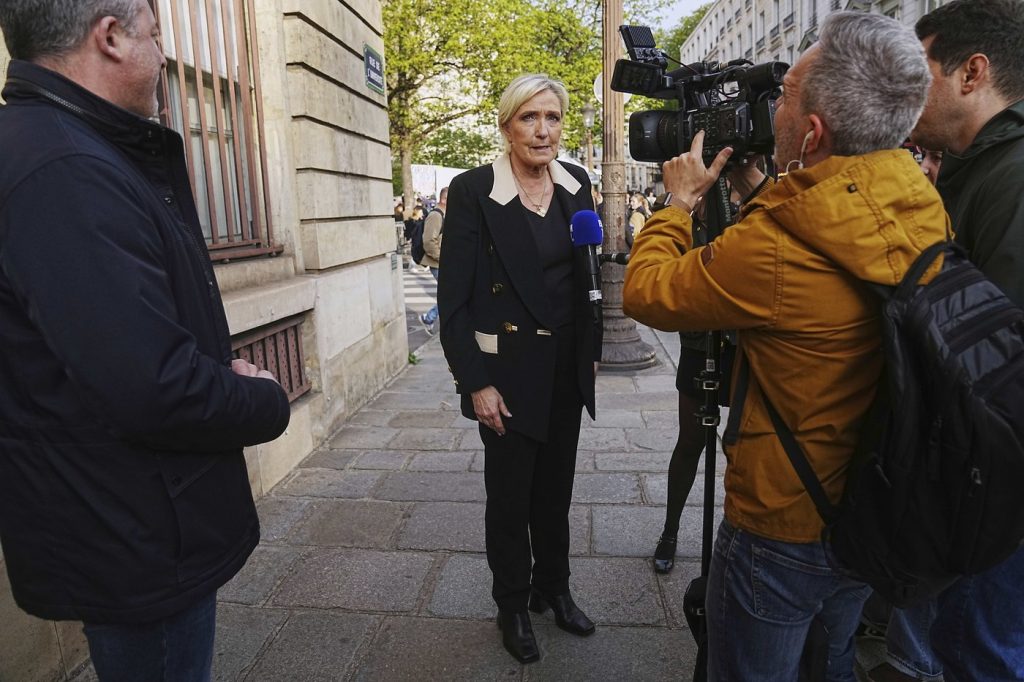PARIS (AP) - Marine Le Pen, the leader of France's far-right National Rally party, is anxiously awaiting a significant verdict as she faces potential political peril that could derail her ambitions in the next presidential election scheduled for 2027. The ruling, expected on Monday, will determine whether Le Pen and 24 other party officials embezzled funds designated for European Parliament aides, a violation of European Union regulations. This trial, which lasted nine weeks in late 2024, concludes with Le Pen asserting that she fears for her political future, indicating that a guilty verdict could lead to her becoming ineligible to run for public office.
The accusations suggest that Le Pen and her associates misappropriated funds intended to pay staff who supported the party between 2004 and 2016. While the prosecutors have recommended a two-year prison sentence for Le Pen along with a five-year ineligibility from holding public office, Le Pen maintains her innocence, declaring in court, “They want my political death.” This chilling sentiment underscores the stakes for Le Pen as she considers the implications of a possible conviction.
If the court finds Le Pen guilty, it might impose an immediate period of ineligibility, which would take effect even if she chooses to appeal the ruling. This prospect raises the alarming likelihood that she could face a new trial at a critical juncture, just months before the 2026 presidential election, should she decide to contest the verdict. She expressed her concerns candidly, stating during the trial, "Behind that, there are 11 million people who voted for the movement I represent," emphasizing the vast electorate that could be deprived of representation if she were barred from candidacy.
The Constitutional Council of France issued a ruling on Friday, clarifying that immediate ineligibility could align with constitutional principles, but it emphasized that judges must ensure the consequences are proportionate and take voters’ freedoms into account. Although this ruling pertains to a different case, its implications are significant in guiding the judges who will evaluate Le Pen's situation.
Le Pen has spent over a decade working to modernize her party and mitigate its extremist image, striving for broader appeal in the French political landscape. As a seasoned politician with prior runs against President Emmanuel Macron, where she notably closed the gap in the second round of the presidential election in 2022, Le Pen has positioned herself strategically for the future. However, the potential ineligibility adds a complex layer to her political aspirations.
In the event of Le Pen’s disqualification, her successor within the National Rally is Jordan Bardella, who took over the party's leadership in 2021. While he is regarded as Le Pen's natural successor and would likely serve as her prime minister if she were elected president, questions linger regarding his ability to convey the same level of appeal to voters. Internal criticisms about his leadership style and focus on personal ambition have also emerged, suggesting that continuity of political strategy may be at risk.
As the verdict approaches, the political landscape in France teeters on the edge of uncertainty. Le Pen’s future, along with the fate of the far-right party, stands in the balance as the court's decision could dramatically reshape the dynamics leading into the 2027 presidential elections. The outcome could not only impact Le Pen personally but also reverberate through the electorate that has shown robust support for her party's agenda in recent years. The intersection of legal proceedings and political ambitions continues to unfold, drawing widespread attention from both domestic and international observers.










